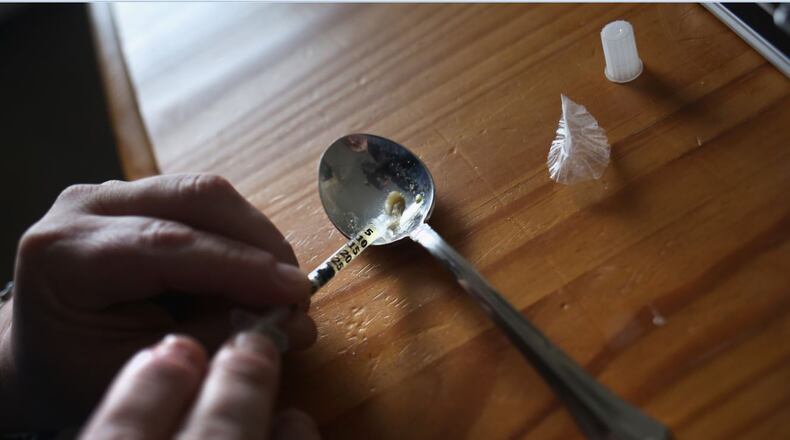That has led to more overdoses, according to those working with addicts.
Lori Erion, the founding president of Families of Addicts, a support group that works closely with families dealing with addiction issues, said she feels overdoses and overdose deaths have been up for over a month.
RELATED: Montgomery County overdose deaths spiking in July
“I’m seeing more people who had been in groups with us or that I knew of dying,” Erion said. “Overdoses are definitely up. People are definitely dying.”
In the first 10 days in July, 10 suspected overdose deaths prompted COAT to send out an alert. The number of suspected overdose deaths in July in the county ended up being 30, just six shy of the 2017 July total and the most accidental overdose deaths since November of 2018.
Dan Suffoletto, spokesman for Dayton and Montgomery County Public Health, said street drugs laced with fentanyl is a continuing problem in the area. The strength of fentanyl in drugs is increasing.
“This is an ongoing battle, and we want to just want get the word out,” Suffoletto said.
In the 19 days of August so far, 19 suspected overdose deaths were reported in Montgomery County. That brings the 2019 preliminary total to 174 overdose deaths, according to data from the Montgomery County Coroner’s Office.
Overdose deaths in Montgomery County set a record in 2017 with 566.
Dayton police have also seen deadly levels of fentanyl. In comparing July to June of this year, officers had 12 more overdose calls. But police used 92 more milligrams of Narcan to revive, or attempt to revive, those 12 additional overdosed people.
The high levels of fentanyl in drugs means it is likely more than one dose of Narcan must be used to save those who overdose, COAT’s release said.
MORE: Dayton cut overdose deaths in half — and learned these lessons to prevent another crisis
Suffoletto said first responders are having to use more Narcan to revive someone. First responders might have enough Narcan to save someone who has overdosed, but an individual may not.
“We’re hoping to stop the perception that people can use these drugs safely and with no consequences,” Suffoletto said.
There is no safe way to do illegal drugs, the COAT release said, but it is important drug users have Narcan available and someone who can administer it in case of an overdose.
“Anyone using drugs should be aware that if they buy drugs on the street, there is a high likelihood that those drugs, including cocaine, may be laced with fentanyl or other potentially fatal chemicals,” said Chief Richard Biehl, Dayton Police.
COAT also sent out a release before the July 4 holiday, warning that the holidays can be a stressful time and there could be an increase in overdoses. Suffoletto said the Oregon District shooting also could have been triggering those with an addiction.
“Everyone deals with stress in different ways,” Suffoletto said.
Erion said the people most are risk in stressful or turbulent times are those who are newly in recovery.
“Those actively addicted, nothing is really going to affect them, they’re just looking to get something,” she said.
AVAILABLE HELP
Here are resources available that the public can use to help prevent overdose deaths:
1. Attend Naloxone training. Project Dawn Montgomery County offers free weekly Naloxone overdose education & distribution every Wednesday at Noon at 601 Edwin C. Moses Blvd, Door F, CrisisCare entrance in Dayton. Project Dawn will also schedule training during evenings and weekends by the request of businesses, faith-based organizations, service groups, and other community groups. Please call (937) 734-8333 to schedule a group training.
2. Be knowledgeable about local treatment options. Montgomery County Alcohol, Drug Addiction & Mental Health Services (ADAMHS) maintains a list of local addiction and mental health treatment options on a free smart phone app GetHelpNowMontgomeryCounty, as well as online screening tools at their website under the "Treatment & Support" tab.
3. Sign up for Know! E-Alerts. Know! Parent Tips, part of Ohio's "Start Talking! Building a Drug-Free Future" campaign, provides twice-monthly emails for parents, guardians and caregivers with tips that contain current facts about alcohol, tobacco, and other drugs, as well as action steps they can take to help children resist peer pressure.
4. Complete a Mental Health First Aid course. This 8-hour course will equip you on how to start a conversation with a family member, friend or co-worker when you recognize they may be experiencing mental health or substance use crisis. To attend a local course contact ADAMHS at (937) 443-0416.
5. Visit CarePoint. CarePoint consists of various services to help those who inject drugs reduce the chances they will do additional harm to themselves and others. The program includes the exchange of used syringes for clean ones, and referrals for substance abuse treatment and other health and social services. Call Public Health - Dayton & Montgomery County at (973) 496-7133 for more information.
6. Rally 4 Recovery. Families of Addicts will hold its sixth annual Rally for Recovery on Sunday, Aug. 25, at Courthouse Square. There will be more than 60 resources for addiction and mental health from 3 to 6 p.m. at the rally. Visit the Families of Addicts website for more information.
BY THE NUMBERS
30 - number of suspected overdose deaths in Montgomery County in July
103 - number of overdoses Dayton Police Department responded to in July
69 - number of overdoses Dayton Police Department has responded to so far in August
174 - preliminary number of overdose deaths in 2019, as of Aug. 19
About the Author

